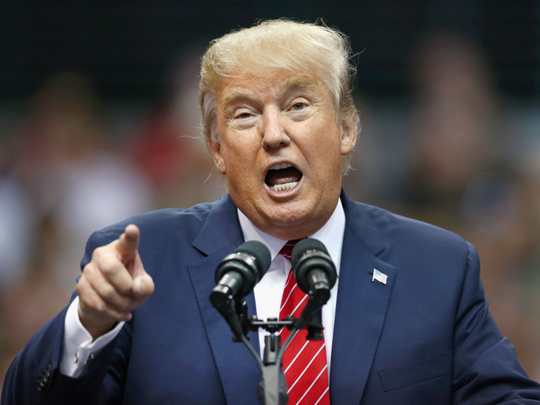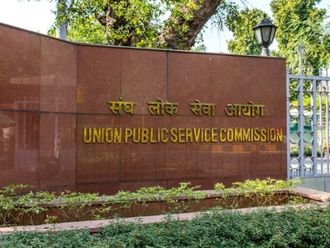
As the Republican Party’s presidential candidates prepare for their second debate, scheduled to take place on Wednesday night at the Reagan Presidential Library in California, it often seems that Campaign 2016 is being driven by inchoate anger.
Donald Trump sets the GOP agenda by repeating constantly that America’s leaders — by which he clearly means Republicans as well as US President Barack Obama and the Democrats — are “very stupid people.” Trump leads every recent poll of Republican contenders. In most of those surveys the number two candidate is Ben Carson, a retired neurosurgeon who, like Trump, has no political experience. Last year Carson claimed that Obama was likely to declare martial law and cancel the 2016 election as a way of holding onto power.
The other Republican candidate who has gained ground (though not nearly as much as Trump or Carson) since last month’s first debate is Carly Fiorina, the former CEO of tech giant Hewlett-Packard.
Their styles are radically different: Carson is as soft-spoken as Trump is bombastic. Fiorina often sounds as though she is giving a motivational TED talk. Yet all three are trying to harness the same well of anger and disaffection. Together the three of them account for between 55 and 60 per cent of the potential GOP primary vote according to most recent polls (with Trump, of course, far in front of the other two). Their success is clearly driven in large part by their status as outsiders — presidential aspirants who have never held public office.
A singular aspect of US politics has long been its belief in amateurs and distrust of career politicians. Other countries have had outsiders win office by promising to shake up the political system, but only in America is the entire idea of being a career politician socially unacceptable. The result is people with decades of political experience claiming with straight faces that they are ‘really’ a university professor, a doctor or a small business owner — i.e. whatever they did for a living before entering politics.
Such people have never, however, had much success in seeking the presidency. While the American political landscape is filled with governors, senators and mayors who arrive in high office without any real experience of how government works (and who usually are shocked to discover that, actually, it is nothing like running a corporation) only once in modern history has a political neophyte managed to secure a major party’s presidential nomination. In 1940 the Republicans nominated Wendell Willkie, a corporate lawyer from New York, to oppose Franklin Roosevelt’s bid for an unprecedented third term (something the US constitution then allowed but now does not). He lost badly.
Among politics-watchers in the US the rise of Trump, and to a lesser extent Carson, is often paired with the enthusiasm among Democrats for Senator Bernie Sanders of Vermont, but the comparison does not really hold up.
Sanders, a political independent who calls himself a socialist, is a unique figure in American politics. But he has also been in Congress for 24 years and is currently the ranking minority member of the Senate’s powerful Budget Committee. That hardly makes him an outsider in the mode of Trump, Carson or Fiorina.
What his supporters share with theirs is a deep frustration with politicians who seem to run every utterance through focus groups and consultants. Whatever one thinks of them, Sanders and Trump feel authentic in a way that Hillary Clinton and Jeb Bush (among others) simply do not.
It is a long way, however, from Sanders’ core tenet that there is simply far too much money in American politics to Trump’s contention that because he is “really, really rich” he is beholden to no one. If you believe (as most Sanders supporters — indeed, most Democrats — do) that a political culture where billionaires prop up otherwise unviable politicians is a bad thing then a billionaire funding himself isn’t much of an improvement.
Yet in one way it is Sanders rather than any of the Republicans headed for California this week who is closest to the GOP hero, Reagan. Like the Republicans, Sanders looks out across the American political landscape and sees much that he detests. Unlike them, he somehow manages to sound positive when calling on his supporters to rise up and reclaim the country’s politics.
It is often forgotten that throughout his career Reagan was a polarising political figure. Many Americans, and more than a few of America’s allies and adversaries alike, viewed him as a dangerous extremist for most of his time in office.
Yet what made him popular, got him elected president twice (and there’s little doubt he could have won a third term if the constitution had allowed it) and keeps his memory bright and shiny today was his unfailing optimism. There were times when this became a bit of a joke, but even critics concede that it was central both to his character and to his political success.
Is it too much to ask for a little less anger and a little more optimism among the Republicans — candidates and voters alike? With the political season only now really kicking into gear, that would be a gift for the entire nation.
— Gordon Robison, a longtime Middle East journalist and US political analyst, teaches political science at the University of Vermont.








